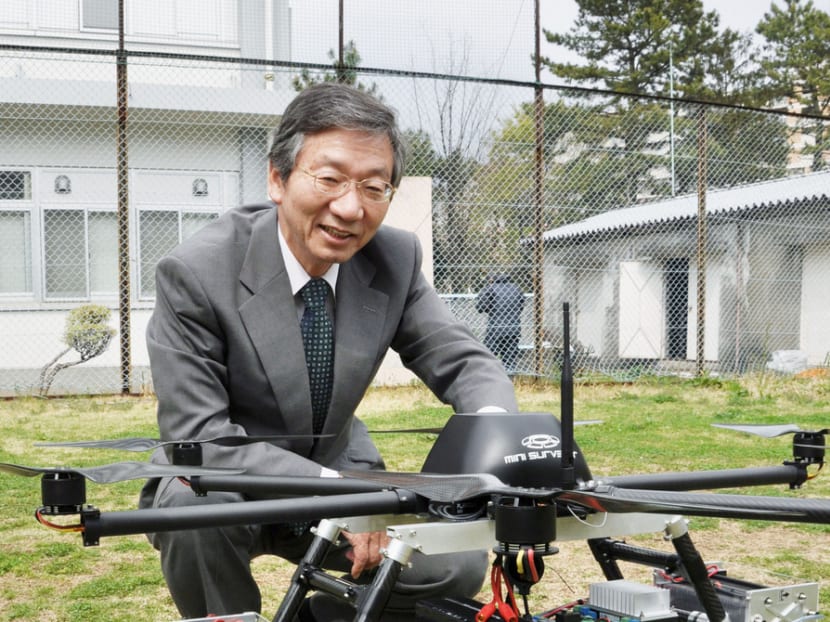Drone home-delivery service in Japan waits in the wings
CHIBA — A city near Tokyo has joined hands with the central government and other partners to commercialise a drone home delivery service it calls “the first step of an industrial revolution in the air”.

Prof Kenzo Nonami with a drone he developed for home delivery service. He expects to see an era of ‘thousands of drones flying above us’. Photo: Kyodo
CHIBA — A city near Tokyo has joined hands with the central government and other partners to commercialise a drone home delivery service it calls “the first step of an industrial revolution in the air”.
“We want to get a headstart in the building of a future-oriented community and disseminate the idea to the rest of the world,” Chiba Mayor Toshihito Kumagai said. The service, also involving private companies and research institutions, is expected to be launched by 2019.
The service envisages large-size drones picking up packages from a warehouse located beside Tokyo Bay and dropping them off at a landing point in Chiba’s Mihama Ward about 10km away.
There, smaller drones will be loaded with individual packages for delivery to the balconies of high-rise condominiums being constructed in the same ward. The drones will all be programmed to fly autonomously using a GPS system.
Japan bans drone flights in densely packed urban areas but the government opened the skies in the coastal city of Chiba 40km west of Tokyo by designating it as a special deregulation zone for the strengthening of the international competitiveness of Japanese industry.
In a test flight conducted in April, the first of its kind in an urban area, a drone carrying a bottle of wine in a basket made a roundtrip flight between a shopping mall rooftop and a nearby park in Chiba’s Mihama Ward.
Chiba aims to start the drone home delivery service before 2020, when Tokyo will host the Olympic and Paralympic Games, and plans to ask real estate developers to set up landing areas for the craft on the balconies of each unit in newly built condominiums.
In June, project participants started meeting once a month. They are working on developing technology to ensure flight stability in adverse weather conditions such as rain and strong wind, and setting up a traffic control system for drones.
Chiba University engineering professor Kenzo Nonami, who heads the project team, said: “We expect the arrival of an era in which thousands of drones will be flying above us.”
About 15 participating private companies have defined their respective roles in the project. Weathernews Inc is responsible for weather forecasts in ultralow-altitude areas where drones are to fly, while NEC and NTT Docomo are taking charge of flight control.
The safety of drones is a source of concern to be addressed in the project, which will see another test flight later this year.
Similar trial flights have been conducted in other parts of Japan but mostly mountainous ones. People in densely populated areas are afraid that drones may fall on kindergartens or schools.
“Safety is of the highest priority,” Mr Kumagai said. “We will move the project forward step by step, while inviting local residents to flight tests.”
Cost and technological problems also need to be addressed. At a project team meeting, retail giant Aeon proposed examining the project’s feasibility in terms of transportation and insurance costs. Technological hurdles must also be cleared, including whether a mobile phone network can be used to control drones.
Home delivery services will be the first step towards the potential wider use of drones in the skies, Prof Nonami said, noting that developing a “flying robot”, which is capable of automatically executing complicated tasks with manipulators, is the ultimate goal of his project.
Prof Nonami heads Autonomous Control Systems Laboratory, a venture business created in Chiba University jointly with some 220 companies and research labs to develop drone-based technologies. KYODO NEWS






